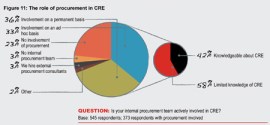by Shane Henson — January 20, 2014—The accomplishment of some of today’s most successful partnerships—in popular culture, politics and the business community—are a result of collaboration to achieve mutual long-term goals, says global financial and professional services firm Jones Lang LaSalle (JLL). The firm’s recently released Global Corporate Real Estate Trends 2013 (GCRES) shows corporate real estate (CRE) and procurement teams how emulating these partnerships by proactively collaborating will help them achieve strategic objectives despite a price-driven outsourcing process.

The graph shows responses to the question, “Is your internal procurement team actively involved in CRE?”
(Click on image to enlarge)
The report unearths the five top corporate real estate risks, including possible negative impacts to competitive advantage and profitability from cost cutting, procurement processes, lack of collaboration between functions, and failure to drive productivity. It also measures insights from more than 630 CRE executives in 39 countries.
JLL’s report found that only 8% of companies globally have retained all corporate real estate functions in-house, a significant drop from the 24% reported in the 2011 GCRES. In the survey, 69% of CRE executives describe procurement as being actively involved in corporate real estate, with 36% describing procurement as being involved “on a permanent basis.” At the largest companies with global headcounts of more than 100,000, an even higher percentage—47%—report permanent involvement.
The involvement of procurement in real estate works most effectively when goals such as employee engagement and innovation are stated as shared objectives, along with price, says JLL. The report found that 30% of CRE executives view outsourcing as a strategic relationship in which partnership value is assessed over the long term, while only 6% see it as a tactic to be executed with the lowest-cost supplier. Many are engaging in transformative relationships involving performance-based incentives, key performance indicators, and risk-sharing to capitalize on value from deeper, strategic partnerships.
However, corporate real estate executives share a concern that the procurement department is not familiar enough with the real estate function to work together toward strategic goals. According to the GCRES survey, 58% of respondents report that procurement has a limited knowledge of real estate as well as the nature and complexity of the services being procured.
“Procurement departments can add efficiency and transparency through standardized processes, but corporate real estate teams must partner with their procurement peers to build a shared understanding of real estate’s contribution to corporate strategy,” said Bryan Jacobs, international director for Jones Lang LaSalle. “Without this collaboration, a company risks undervaluing its real estate partners or constraining their abilities to deliver long-term productivity gains.”




